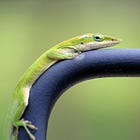Interview: Literary Veganism
On editing, the connections between animal advocacy and storytelling, and advice for getting stories published
Welcome back to another Wizard of Claws interview!
There aren’t many vegan publications that accept short fiction and poetry submissions, and there aren’t many (or any) literary publications that focus on the animal and animal advocate experience. As such, Gregory Tague and Fredericka Jacks—the founders, editors, and all-around power couple behind Literary Veganism—created a niche journal that feels like it was tailor-made just for me. If you’re also looking to find writers and stories that reflect your values, they’ve got you covered!
General Questions
Can you share a little bit about your background, including how you came to care about animals and creative writing?
GT: Neuroscientist Antonio Damasio has written about “the feeling of what happens.” This means that you can forget details about an event but not the feeling. For instance, as an impressionable teenager, I read an article in the Atlantic Monthly written by a man who said there was nothing ethically incongruent between listening to classical music and reading great literature in one’s comfortable home after killing and field dressing deer in a brutal hunt. While details of the article, like the identity of the author can’t be recalled, after all these years there’s a feeling of malaise about justifying gratuitous animal killing with capitalistic elitism. I was highly influenced by Pilgrim at Tinker Creek by Annie Dillard and The Lives of a Cell by Lewis Thomas, among other nature-themed books. From an early age, an interest in nature and science, especially as it was presented by creative minds, was attractive. After graduate school (Ph.D. in English and American literature), I had done some creative writing but then focused on scholarship. Then, in the early 2000s, we ran a small publishing company and tested the waters with five, themed literary anthologies on the following subjects: medical humanities; immigration; war; the human condition; and faith. We give away more copies than we have sold, but that’s okay. We set up a website to go along with the books, and although we don’t publish any more books, the site is active, here. Very late in December of 2019, I had a brainstorm one evening as we sat drinking wine and listening to Sibelius: why not start a literary journal online, keep it simple, and focus on veganism.
FJ: I was mostly vegetarian from an early age. I influenced Gregory, so by the time we were married, we had stopped eating red meat, pork, and veal. We were never much into fish. It was not until later that we began the slow migration away from chicken and then, eventually, dairy. Now, we cannot imagine why someone would not want to be vegan for ethical reasons. We don’t preach or judge, so our daughter decided, by our example, to embrace ethical veganism. We see, too, that without any pressure, some of our friends have gravitated away from a meat-heavy diet.
Most animal advocacy focuses on creating tangible changes in the real world. What role can the arts play in changing how people think about animals?
Through cultural evolution the arts can have a huge impact! Think of all the popular music, videos on social media, movies, television shows and documentaries, books and magazines, stories and poetry, and visual art that people across the globe come in contact with on a regular basis. If a small portion were devoted to ethical veganism and affected a few, and then those people influenced a group, the outward spiral could become immense. However, it’s important to note that as ethical vegans we don’t necessarily encourage fad or diet veganism, which could be a result of popular culture. But strong literary characters and poetic voices can have a meaningful impact on people of all ages, and that’s what we try to accomplish with the Literary Veganism journal — to help readers become sensitized to the sentience of nonhuman animals.
What can animal advocates learn from fiction/storytelling?
Animal advocates can learn how animals think and feel, if a storyteller can get into the mind of a nonhuman being. They can learn how the power of poetry or story can influence others — indeed, that’s why the arts have endured for millennia. Also, animal advocates can learn from human stories how they have been deeply affected by interactions with animal cruelty. The words of workers in the farm animal sanctuary movement can be powerful, too. People need to make their own choices, but young minds could feel the greatest impact when confronted with stories about the plight of animal suffering.
Any advice for aspiring authors to improve their craft, especially as it pertains to writing about animals?
John Yunker and Midge Raymond run Ashland Creek Press, a literary publisher devoted to animal and environmental issues. At times, they run courses on writing about animals. Many of their books (e.g., Writing for Animals) feature stories that could be models. John and Midge maintain a list of journal and book publishers open to writing about animals, here. The main thing: try to understand how a human attempts to gain insight into the perspective of the natural world. Can we? Maybe. Should we? Yes. Try not to be anthropocentric, but it’s okay to be anthropomorphic. Try to find a writing group, or at least a companion, who is also interested in animal and environmentally friendly writing — share drafts and work together. And as any editor will tell you, whatever you write, revise multiple times.
Publication Questions
What is Literary Veganism, and how did you come to be its editors?
Literary Veganism is one of those eureka moments. I was literally sitting in our then 1910 Brooklyn brick limestone home before dinner, trying to clear my mind from a busy semester of teaching, and shouted — I have an idea for a new journal! We saw a need for such a journal, and to our knowledge, no one has yet copied us. Literary Veganism accommodates writing by, for, and about vegans, but you don’t have to be vegan to enjoy reading about animals. Lots of the material we get is serious, but we are fortunate to have published some humor. We also have interviews and work from artists. We never imagined our list of contributors would be so large and include accomplished authors like Marge Piercy.
Can you explain what you do with a story/poem in the time between a writer’s submission and the story’s publication?
We know what we like. So, if the submission fits with the goals and mission of the journal, we read it. Sometimes we know immediately there's compatibility between the submission and the journal; other times, we have to mull over a submission and talk about it. Writing really needs to fit the ideology of the journal (as strange as that may sound) and be of sound literary merit. We’ve been privileged to have some really fine submissions. Some skirt with our mission/goals but are of high literary quality, while others might not be of the highest literary quality but really hit home in terms of the animal ethics. Editorial decisions we make could not be helped by AI at all, as you see.
How does your editing approach vary between prose and poetry? How do your editing approaches differ from one another?
We tend to have a light touch with the editing, unless something is glaringly wrong or offensive. We bet some of our contributors would say they are amazed at how quickly we respond and decide/or not to accept a work and then format it for online publication. As for online formatting, the poetry is the most difficult to set up. With prose, we prefer shorter pieces for ease of online reading, and with that in mind we usually work with writers to combine short paragraphs in a prose piece without harming the work’s integrity.
What can writers do to make their queries/stories stand out?
Read the guidelines! We know that’s been said millions of times by all editors, but you’d be surprised — or maybe not — by how many submissions we receive where we say, What? It’s important to note that we don’t use an impersonal submission platform: contributors must reach out to us, identify themselves, and give us an idea of what they’ve done and why they think we should consider their work. We’ve had no complaints so far; this personal touch is something you don’t find very often these days, and we tend to be quite responsive to queries. Nevertheless, a query can look great, but then the submission falls flat. In a nutshell: with the introductory query, be professional, succinct, and honest.
I’ve found that many online publications prohibit submissions that include violence toward animals. Since Literary Veganism likely cares about how animals are represented far more than the average journal, how do you feel about the use of animal cruelty in fiction? Do you think disallowing it, full stop, contributes to people’s overall squeamishness or discomfort about addressing the horrors animals face in the real world?
This is a good question and one we’ve grappled with. As a journal that fosters ethical care for animals, we accept submissions that include violence toward animals only if there seems to be some ethical component for the reader, something emotional or feeling that the reader can connect with and say, Oh my god, that’s terrible! But yes, there are stories and poems and artwork on the site that could be disturbing; yet it’s not violent depiction for the sake of violence but to help the reader come to an understanding of and to become sensitive to animal cruelty. We believe in cultural evolution, so the journal is one component of many to help people become aware of the horrors we inflict upon the nonhuman animal world.
What does the future hold for Literary Veganism?
Right now, we have no plans for big changes; rather, we’ll keep going as we have for the past four years. We don’t really advertise, and yet good writers find us, perhaps by word-of-mouth, internet searches, or our listing in Poets & Writers. We’ve talked about possibly maybe putting together yet another anthology of poetry and prose from the journal, but thinking about the amount of work involved after having done so many books just makes us tired. We shall see. If there’s a publisher out there willing to work with us and offer assistance, feel free to contact us.
Final Questions
How can readers find you and Literary Veganism online?
Literary Veganism is located at litvegan.net Readers and writers might also be interested in our sister site, the ASEBL Journal — animal studies ethical behavior literacy. There, we publish short opinions that are academically informed. If one goes to the ASEBL site and clicks on the About tab, guidelines with links to sample writings can be found: asebl.net We are always open to queries.
Do you have any related upcoming projects, outside of Literary Veganism?
GT: I’ve just finished a new academic book called Forest Sovereignty: Wildlife Sustainability and Ethics, to be published this year by Peter Lang in their series on Plants and Animals. A thumbnail of the book was published by the American Philosophical Association here.
Anything else you’d like to share?
For anyone who is interested about the ethical scope of veganism, you might want to check out Gregory’s book The Vegan Evolution. This scholarly work talks about animal agriculture and climate change, meat and dairy diets and health, human evolution, ape diets, etc. You can read a summary and some extracts here.








Thanks Elise - I've added Literary Veganism to our Sentientist Culture page! https://sentientism.info/sentientism-in-action/sentientist-culture
I had a poem published a while back with Literary Veganism - was probably one of the fastest responses I've ever had on a submission. Really interesting to hear its evolution.